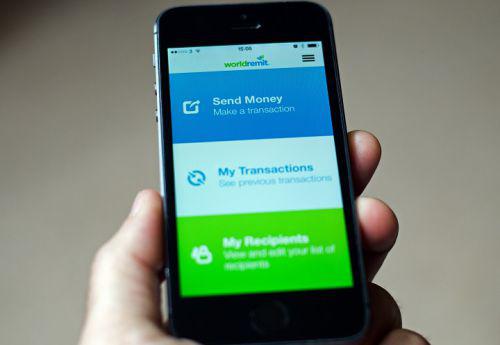
By Andrea Ayemoba
International money transfers to Africa are rising. There are good reasons for that.
With the choice of the right online money transfer provider you can save yourself a high amount of remittance fees!
Here we review the latest options to send money home using international currency transfers (also called remittances) and smartphone applications. If you are living away from your home country or have migrated for work reasons, read on – these suggestions may help to save you time and bank charges if you wish to send money home.
Take a look also at the extensive article on money transfer services.
Mobile money remittances
Mobile money remittance services are a genuine game-changer for those who are abroad (such as Diaspora or migrants and refugees) and are looking for a quick, convenient and simple service to send money home, especially to or from African and Arabic countries. Historically, banks have charged high fees but more recently, innovative and enterprising currency transfer companies have made migration easier with a reasonably priced service.
The worldwide market for currency transfer services is estimated at around $500 billion US Dollars per year, with the African proportion continuing to increase. Experts see this as linked to the growth of mobile phone usage.
A peer-to-peer payment via a currency specialist can be made in cash, via bank accounts, using credit and debit cards (including prepaid debit cards) or via mobile transfer. Mobile-to-mobile payments use a smartphone app (without the need for a tablet or computer) and are becoming increasingly popular with economic migrants and foreign workers throughout Africa and the Arabic countries.
Choice of remittance provider
If you are an overseas worker or expat property owner, you may have noticed that there are a number of money transfer websites, advertising easy transactions with a transparent process and charging structure. However, which site is best? A remittance service that may be the best choice for a business owner may not necessarily prove to be the most economic one for a student studying abroad at a foreign university, for instance.
Whether you wish to do a monthly money transfer or just occasional mobile-to-mobile remittances to send money abroad, the concept of a mobile money wallet that can be used to send money overseas is very much worth considering, not least because the fees are lower than a conventional international money transfer through a typical bank.
Broad range of providers
Some currency transaction service providers such as Western Union and Moneygram are long established. The newer start-up companies such as M-Pesa and Bitcoin have introduced mobile-to-mobile international remittances as well as other services, with applications available in the Android App Store or as a download from the website.
There are other recent start-ups, many of which are based in London and which offer mobile payments to send money abroad such as WorldRemit, Azimo, TransferWise, CurrencyFair, Xendpay and World First. These may also be worth considering as they offer foreign currency transfers to and from many countries, although some are not as suitable as others.
Conversely, mobile applications that are not suitable for international remittances to African countries include Dwolla, Google Wallet, Pay Pal, Square Cash, Venmo and Xoom.
Finally, regional providers include Ooredoo, Sendwave, Simbapay and the rising star Flutterwave.
Transaction fees and exchange rates vary daily between providers, the countries involved and transaction amounts. Typical fees comprise a flat charge plus a percentage of the transferred amount.
Western Union & Moneygram
These two well-known companies have dominated the market for years but are accused of opaque charging schemes and exclusive agency deals. Standard sender fees are around USD $10 with average exchange rates. There is no charge to the recipient and cash transfers are delivered within a few minutes.
WorldRemit
London-based WorldRemit was founded in 2010 by Ismail Ahmed to introduce the gains of the new communication technologies to the international remittance market. Established as online service for people living abroad it focuses especially on money transfers via computer, tablet or smartphone. All state of the art solutions for sending and receiving money online are covered by WorldRemit. And this service is available in the most countries of the world with significant low fees.
Azimo
London-based Azimo has recently enhanced its payment services, advertising fast, easy transactions and good value for everyone. Serving over 195 countries including instant transactions to Nigeria, the company also advertises fee-free transfers (excluding SWIFT and credit card costs) from Ireland, France, Portugal and Finland.
TransferWise
Backed by a consortium of innovative thinkers including the entrepreneur Richard Branson, TransferWise is another relative newcomer to capitalise on the widely held mistrust in banks. However, its charging structure is not suited for the African market.
CurrencyFair
Offering better than average exchange rates, Currency Fair promotes a user-friendly interface and modest fees. Registration is simple and the company has headquarters in the UK, the Irish Republic and Australia. The company’s Dublin spokesperson reported an average of over $5,000 on each transaction.
Xendpay
Authorised by the FCA, Xendpay advertise safe and cheap transactions including one-off transfers and low amounts. Debit and credit card payments are possible along with bank transfers, but not mobile phone payments. There are no compulsory fees or hidden charges; remittance senders are invited to pay what they consider the service to be worth. Over 215 countries are served, including the Seychelles and the Middle East.
M-Pesa
M-Pesa may be more useful for transfers of less than $1,000. Notably, the M-Pesa service from Safaricom not only works on smartphones but also on more basic mobiles, making the service more easily available to a wider range of potential customers. M-Pesa’s monopoly has recently been ended by Equitel, a money remittance company set up as a joint venture between Equity and Airtel and which uses thin SIMMS, a microchip installed in parallel with phone SIMM cards.
Ooredoo
Originally a mobile phone operator, this company is centred in Qatar with services focussed on the region including Kuwait – with mobile wallets, a shop network and self-service machines (QNB ATMs). Ooredoo also works with Moneygram to extend its global reach to 200 countries from an Ooredoo mobile phone, as well as to bank accounts in Kenya, the Philippines and Sri Lanka.
Simbapay
This regional provider offers simple money transfer to the main hubs of Kenya and Nigeria with zero fees. Elsewhere, transfers are available into bank accounts for a low fee. The company uses mobile money wallet services such as M-Pesa, Airtel and Paga.
Sendwave
This service has been rated as very useful for Ethiopia and East Africa transactions. There are no sending fees from the USA and Canada, and the web interface displays a live exchange price and comparisons with competitors.
World First
World First has a minimum transfer amount of around £1,000 (or equivalent) and supports 121 different currencies with offices in the UK, Europe, Australia, Hong Kong, Singapore and most of the USA.
Finally, smartphone apps that are popular but which are not suitable for international remittances to African countries include Venmo, Xoom, Square cash, Dwolla, GoogleWallet and PayPal.
Which provider is the best for you?
Given all these new currency transfer companies and various mobile applications, which ones are best to harness this fintech (financial technology) and freshly thought approach?
Most remittance senders look for innovation and fees that are more economical. Similarly, experience tells us that competition reduces costs, providing that quality and regulatory standards are enforced. The typical charge for standard old-fashioned services is around 8 per cent – and, even, double that in some parts of Africa Some money transfer corridors charge more than others to send money home – South Africa to Botswana or Mozambique to Zimbabwe is more costly than, for example, the UAE to Pakistan or Singapore to Thailand.
Currency brokers typically mention their regulation credentials on their home pages with further detail under company descriptions or ‘About Us’ sections. Fees can be checked and many providers offer introductory deals on initial transactions, with a simple and easy to understand signup procedure. As part of this process, new customers are required to provide personal and address identification; this is for security and to deter crime.
Once registration has been completed and your new account is open, you will then be able to explore the options available, consult the help file or follow any confirmation instructions you receive from your new provider to send money online.
Money transfer apps guide Africa
For more information about this important and exiting fintech market visit my website apps-for-money-transfer.com. Either you read more about the leading online money transfer providers and apply it for yourselves. Or you take the opportunity for a guest post and illustrate your point of view of this interesting segment.
By the way: I invite you to visit my e-learning website or my medical exam preparation website, too!
Jens Ischebeck is an e-learning and online courses specialist.































